The Volkswagen ID.7 Is The Electric Passat VW Needs
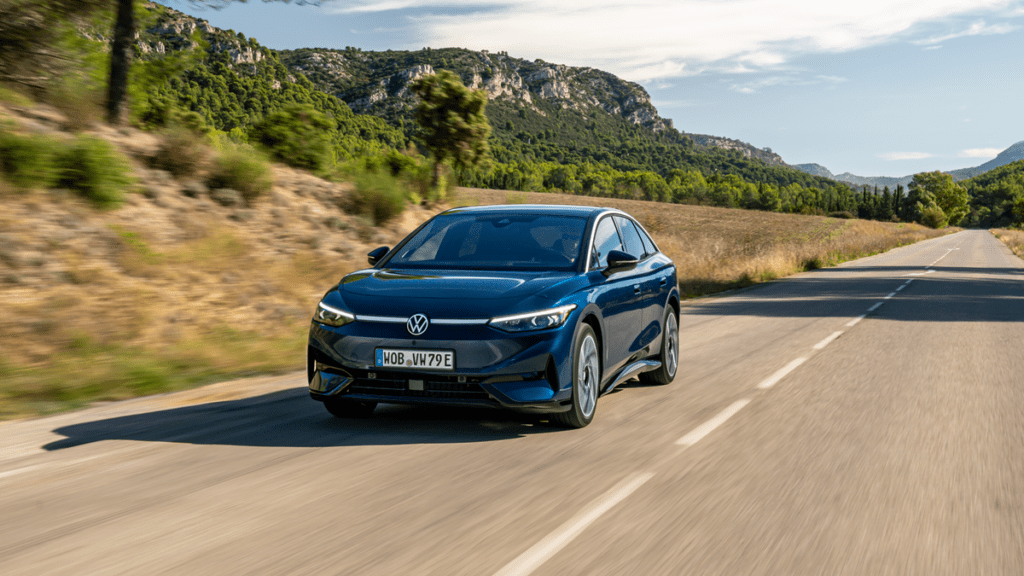
The world’s largest automaker was built on the back of mid-sized sedans. Volkswagen has always been great at building Passats, and the Passat has always been a pretty middle-of-the-road quasi-luxury German sedan with at least a veneer of quality. For the 2024 model year, VW’s new sedan for the everyday driver is going electric, and the ID.7 is taking that space. The ID.7 is a perfectly acceptable Passat replacement. The Passat is dead, long live the Passat.
Royal Enfield Super Meteor 650 | Jalopnik Reviews
This segment is shrinking in the U.S. market, and indeed shrinking globally, as trucks and SUVs continue their march toward total domination. The major competition for Volkswagen used to be the big selling Honda Accord and Toyota Camry, or upmarket competition from the BMW 3-Series, Mercedes C-Class, or Audi A4.Somewhat ironically, it has taken Tesla moving in to this neighborhood with the Model 3 to prove the global market for sedans isn’t exactly on life support.
For at least as long as Tesla has existed, writers like me have been throwing the term “Tesla killer” around to describe basically any EV that’s competent. Volkswagen isn’t under any impression that the ID.7 will move 180,000 units a quarter, and it knows that most of these will be sold to fleets. That said, if you’re an automaker right now and you aren’t trying to ‘What if Tesla, but better?’ at least some of your product lineup, you’re throwing away money.
Take the daily comfort and usability of a Tesla Model 3 and blend it with the comfort and general quality of a Volkswagen Passat, and you’ve got an idea of what the ID.7 is. It isn’t going to set the world ablaze, and you probably won’t lay awake nights thinking about driving it, but it’s perfectly fine, and that’s perfectly fine.
Full Disclosure: Volkswagen flew me to Marseille, France to drive the new ID.7 around for a day. I was given a nice hotel room and plenty of delicious food.
Image: Bradley Brownell
What Is The Volkswagen ID.7?
As the sixth member of Volkswagen’s ID electric family (though only the third headed to the U.S. following the ID.4 and ID.Buzz), Volkswagen is throwing their bread and butter sedan into the deep end of the electric car pool. The ID.7 is based on 2022’s ID.Aero concept, and it looks surprisingly like the preview. If you’re not looking for a compact crossover or a minivan with extrovert styling, but if you have to have a Volkswagen EV, this is the one for you.
ID.7 is slightly larger in every dimension than the Passat (and Arteon) it replaces. With a flat floor and somewhat tall roof, the rear seat passengers get a lot of that added space. This is a large, airy, and roomy commuter machine. You can really stretch out in this thing.
Based on Volkswagen’s Modular Electric-Drive Toolkit (MEB) platform, this is more or less a long-wheelbase ID.4 that sits lower to the ground and has a more fastback-style hatch. Visually, it’s a bit simpler than its MEB counterparts, a sedan design with some weight to it and an of-a-piece cohesiveness. It’s a far cry to call it sexy, but it’s perfectly inoffensive, as any middle-of-the-road sedan should be.
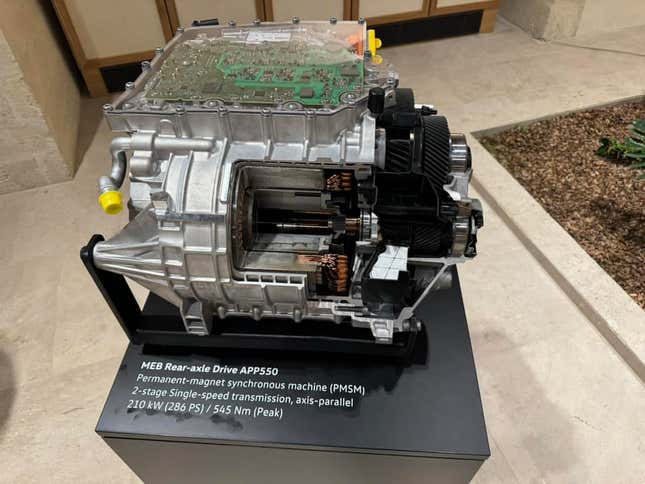
Image: Bradley Brownell
At launch the ID.7 will be available with a 282 horsepower electric motor mounted on the rear axle, and an 82 kWh battery. There aren’t any EPA range numbers for the ID.7 yet, but it achieved 386 miles of range on the WLTP test. The less-aerodynamic ID.4 crossover was capable of around 275 miles of range, but Volkswagen says it has worked to increase efficiency in its new drive unit (which the ID.4 will also get for the 2024 model year).
Larger battery models will follow soon, and an all-wheel drive ID.7 GTX model will eventually be available as well. A wagon is already being prepped for Europe, but likely won’t make its way to the U.S.
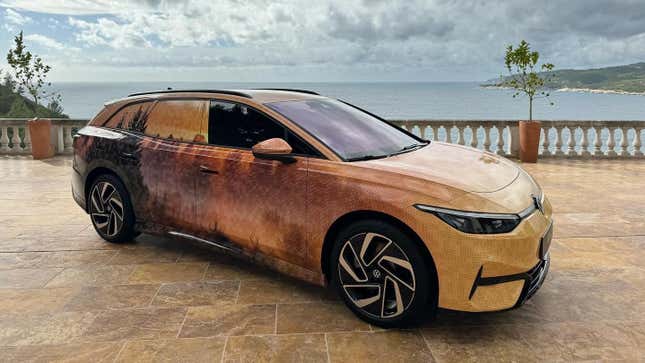
Image: Bradley Brownell
How Does The Volkswagen ID.7 Drive?
Without meaning to diminish the engineering that went into this car, it drives pretty much exactly like you’d think it would. It’s a large electric rear-wheel drive German sedan with just under 300 horsepower, so it’s quiet, comfortable, reasonably quick, and relaxing. Most electric vehicles kind of drive the same, and there isn’t a truly bad car on the market today, so you can expect it to at least clear some basic hurdles.
In the few hours I had to experience driving this car, I was afforded many different on-road scenarios. My journey in the ID.7 started at the Marseille airport, and navigated the French autoroute system southeast to get some bumper-to-bumper traffic action in Marsaille proper before hopping on the Col de la Gineste up and over a small mountain range to the gorgeous coastal paradise of Cassis for lunch. After lunch we wound our way north on some gorgeous mountain roads to catch the A51 north to Mane. The following morning I had another couple of hours of highway driving to get back to the Marsaille airport for my 6 a.m. flight home.
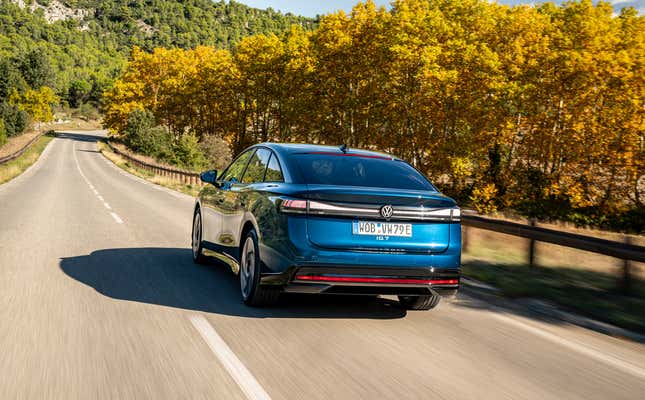
Image: Volkswagen
No moment of my time with the ID.7 could be called unpleasant. Even dropped into the midst of borderline violently aggro French traffic, I felt more relaxed and cognizant than I imagined I might. Visibility is good with a large windshield and reasonable-though-not-small a-pillars. The car’s driver assists helped me maintain awareness of the erratic cars around me, and kept me centered in my lane (and centered mentally).
I think I would have preferred the ability to switch to a one-pedal driving arrangement, but Volkswagen believes traditional coasting is more efficient than aggressive regenerative braking. If this is your first electric car experience, it’s certainly easier to become acquainted with, but particularly in a harsh traffic environment, I prefer a one pedal experience.
When pushed, the ID.7 doesn’t fall on its face. As with pretty much every electric car, it’s a hefty machine at 4788 pounds, but the weight is mounted down low and between the axles. It isn’t going to win any skidpad lateral roadholding competitions, but it’s certainly enough grip and sure-footedness for the average driver. For someone who drives like my mother, this might as well be a hypercar.
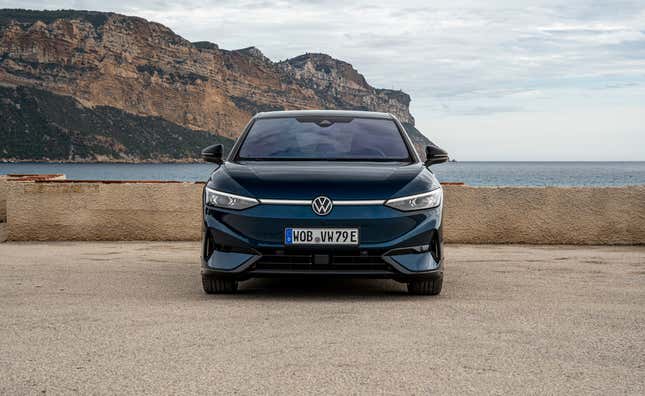
Image: Volkswagen
There are drive modes for Sport, Comfort, and Individual, as you’d expect. Sport mode has more aggressive regenerative braking, a stiffer ride, and slightly sharper steering turn-in.
What Makes The ID.7 An Appropriate Passat Replacement?
The ID.7 is exactly the spiritual successor to the Passat that Volkswagen wanted. All of the hallmarks of a good Passat—the comfort, roominess, quiet ride, capable (though not mind-blowing) handling, a high appointment interior, and a hewn-from-a-solid-block-of-granite feel of general quality—are present and accounted for. The new permanent-magnet electric motor is smoother and quieter than any VR6 ever could have been, and provides good acceleration.
Passat used to be in the middle of an extremely competitive mid-sized sedan marketplace. People would buy them because they cross-shopped a Ford Fusion, Toyota Camry, or Chevrolet Malibu and found them lacking against the German’s comparatively impressive accouterments. Over the last two decades, this market has completely tanked, replaced by a shift in strategy to compact crossovers. If the commuter sedan market were still as staid and boring as it was in, say, 2005, the ID.7 would probably be a front-runner. It’s a nicer driving experience than anything in that segment today, Honda Accord included. But it had better be, because it’s likely to be significantly pricier than anything in that market.
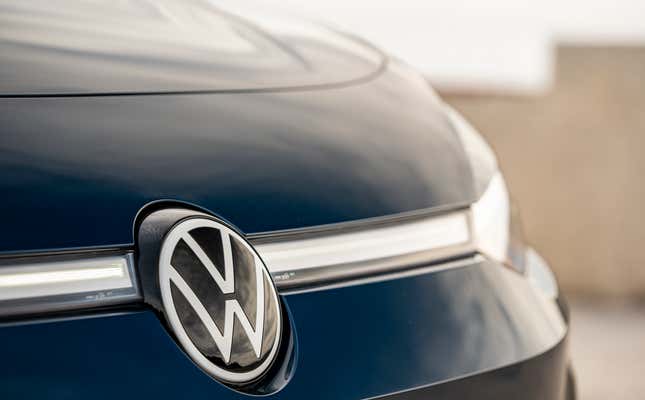
Image: Volkswagen
What I liked
Far and away, the thing I liked most about driving this Volkswagen was the seats. These well-bolstered seats are perfectly sculpted to keep you in place and in comfort. They’re heated, cooled, and massaging, so you’re definitely going to arrive to your destination relaxed and de-stressed. With the heavy porty city traffic, incomprehensible street layout, and manic European driving standards, I absolutely needed these seats to keep my cool.
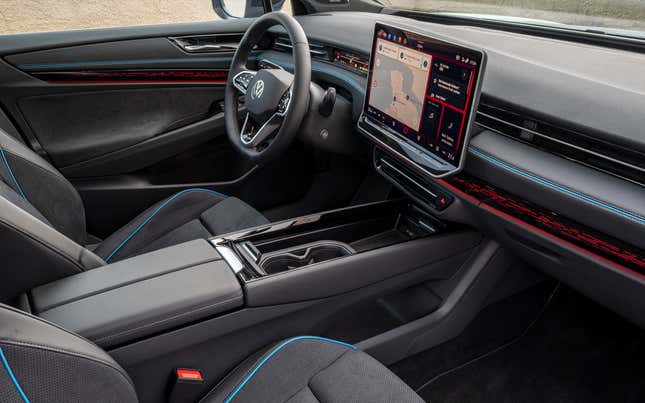
Image: Volkswagen
The electrochromic sunroof is a cool, though not entirely new, addition to this otherwise fairly regular sedan. With the swipe of a finger, you can change the large glass roof panel from crystal clear to milky. It does a decent enough job of blocking out the sun and heat, while giving the cabin a comfortably light and airy feeling.
The back hatch just swallows everything you throw at it. There’s no reason you couldn’t fit four adults and all of their luggage for a weekend—or indeed a week—away. Sedans probably should have had hatches all along, really.
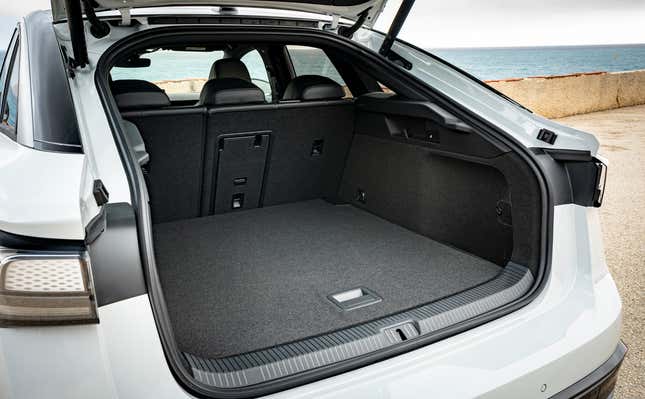
Image: Volkswagen
The head-up display was vibrant and easily legible. While a lot of cars offer this now, and have for quite some time, this was the nicest looking system I can remember using. I like the HUD especially because Volkswagen took this as an opportunity to downsize gauge cluster and increase forward visibility over the dash. The gauges in the dash still provide appropriate information and a level of redundancy with the HUD, but the reduced screen size is a welcome shift from the market-wide trend of giant information dump screens.
What I Didn’t Like
After trying two different iPhones, I determined that I could not get the Volkswagen’s Qi charger to do anything but superheat a phone while adding zero power to the battery. This is admittedly a small sample size, and the car is pre-production, but it’s a technology that really should be perfected by now.
It seems like enough page space has been dedicated to Volkswagen’s center stack system and how un-good it is. The version launched with the ID.7 is a slight improvement, as they finally back-lit the HVAC control sliders and added a hard-press to the steering wheel haptic buttons, but they’ve taken additional steps backward. In order to adjust the air vents in the dash, you now need to jump down three menus and slide your finger around to point them where you want them to be. Porsche also does this in the Taycan, and it’s just as infuriating there.
Still no frunk.
How Much Is It?
No idea. Volkswagen hasn’t announced pricing for the car yet, despite it being delivered to dealers in just a couple of months time. With this as the company’s flagship EV (some within the company compared it to the Phaeton) it’s probably going to be a bit on the pricey side. It’ll probably slot in somewhere around $50,000.
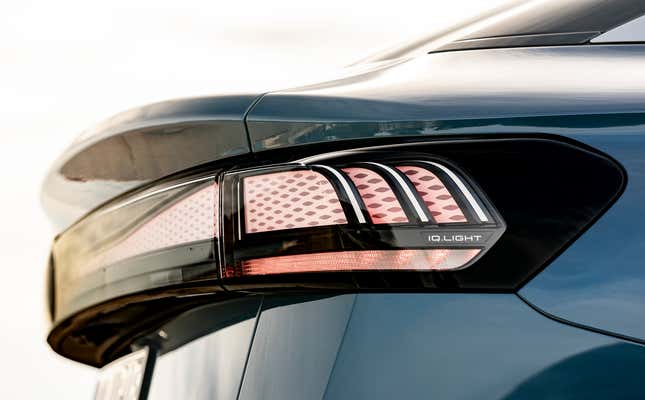
Image: Volkswagen
The Passat was always an almost-Audi at Volkswagen prices. Even within the VW AG family, the ID.7 is going to be a tough sell for most at fifty large, especially considering a base model A4 undercuts that by almost ten grand. Certainly there are benefits to going electric, but there are drawbacks, too. Is the average joe going to find ten thousand dollars worth of benefit and refinement in an ID.7 that he won’t find in a 2.0T A4? Brand cache and emotional connection go a long way in the middle luxury demographic.
That price tag is putting the ID.7 directly up against lux offerings from BMW’s i4, and Cadillac’s Lyric, and much faster (though not as well built) machinery in Tesla’s Model 3 Performance. It’s a competent offering from Volkswagen, but it is stepping into a mature EV marketplace with solid competition.
This is a good car. I might even go so far as to say it’s a great car. It could probably have been built with an Audi badge on it with no further changes. But at fifty grand, I fear Volkswagen is right. Most ID.7s will end up in fleets, rather than average American driveways.



